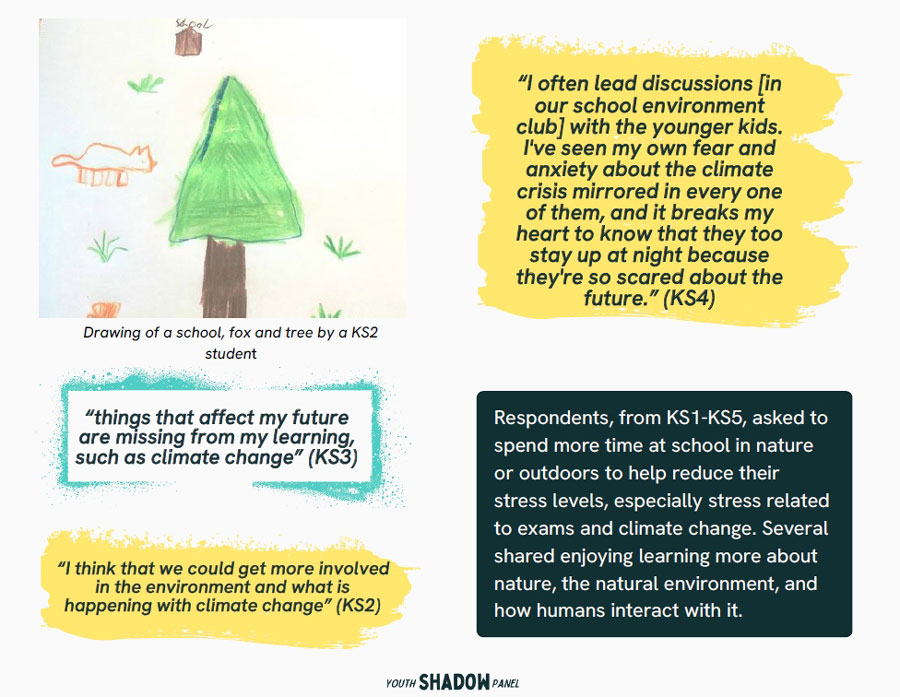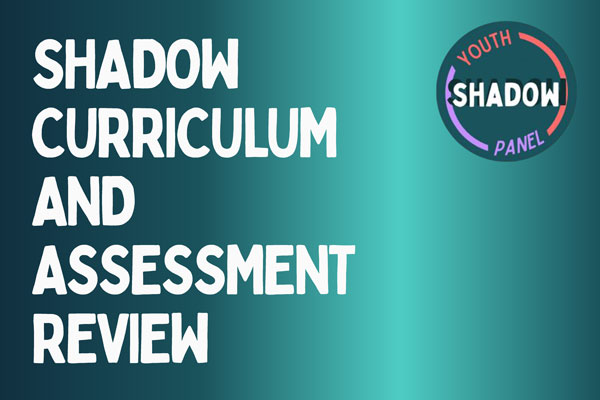The Government has recently held a review of Curriculum and Assessment. There wasn’t a clear route for young people to engage. This sparked an idea from students at Teach the Future that they could run a youth led review. This Shadow Review has just issued its Interim report having worked with many young people and youth organisations.
Here are some conclusions and quotes from the Interim report that focus on climate change education.
Many respondents, from KS2-KS5, reported education around climate change, environment and/or nature to be “missing”, “ignored” or taught in an “unengaging way”. Several respondents, across key stages, commented that learning about climate change is “important” in life, that they want to know more and that it is “linked with every other subject”. Yet, some respondents shared that when they had been taught about climate change, it is focused on “western perspectives”, and that they believe their teachers feel they can’t speak more about it as it’s seen as too “political”.
KS3-KS5 respondents also shared how they experience “eco-anxiety” and want more time to interact with nature, support with eco-anxiety at school, and to be prepared for “better climate resilience”.

Respondents, from KS1-KS5, asked to spend more time at school in nature or outdoors to help reduce their stress levels, especially stress related to exams and climate change. Several shared enjoying learning more about nature, the natural environment, and how humans interact with it.
Climate and nature education should be intregrated across the curriculum
- Integrate climate change and sustainability across all subjects, in a solutions-centred way. This could be done, at a minimum, by looking at existing content through a climate lens.
- Ensure that text books and exams stay up-to-date with climate science.
- Support teachers to use climate change as a meta-topic to facilitate more
interdisciplinary project-based learning, to break down subject silos.
- Facilitate more learning about, and connection with, nature.
“natural world should be incorporated into lessons” and believe “we need an education…about how we can make change.”
Particularly referencing this last quote Project Earth has been in touch with the Shadow Review and Teach the Future to see how it can help support what young people are calling for.
Project Earth has seen brilliant and original ideas emerge from the initial pilot in the three areas we concentrate on:
- Technological Innovation: We provide a platform through which young people can present innovative technological concepts that can be harnessed to combat environmental challenges.
- Social Transformation: We provide young people with the opportunity to develop and share ideas on how social and behavioural change can be utilised as a tool to help combat climate change both locally and globally.
- Cultural Exchange: We aim to empower young people to use creative storytelling to explore and share their cultural heritage in relation to the environment, thus facilitating a better understanding of how climate change is variously affecting communities around the world.
Project Earth is affiliated to the Earthshot Prize and supported by a phenomenal group of expert advisors https://projectearth.global/advisors/ who have agreed to support and help with ideas from young people.
Project Earth supports young people to act and innovate in the face of the worsening impacts of climate change. We are helping young people to develop their ideas and bring them to fruition. Most climate accelerator initiatives support young people between 18-35. Project Earth supports young people from 8-18 to act to make their future better. We have found this approach profoundly counteracts climate anxiety.
Please contact Becky Parker becky@projectearth.global

